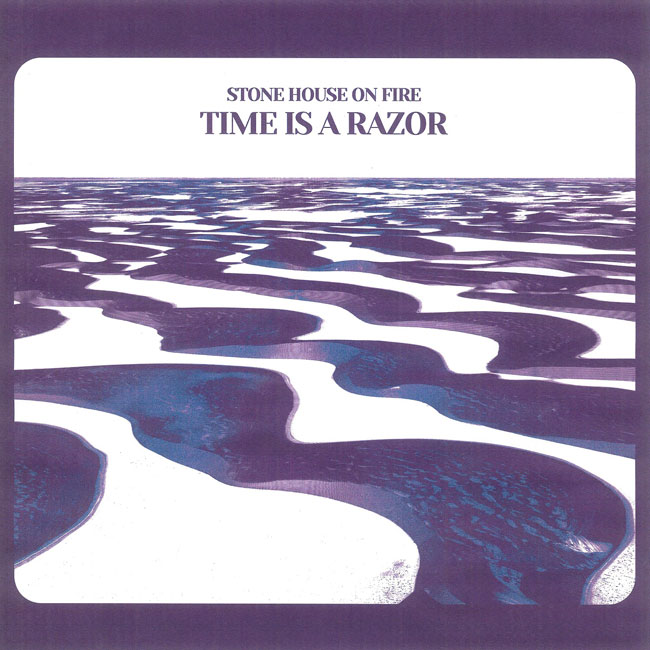Review: Stone House On Fire ‘Time Is A Razor’
I am, admittedly, woefully behind the times when it comes to South American stoner rock, doom and heavy psych. Other than the immortal Los Natas, and another, albeit much more controversial, band that shall remain nameless, both from Argentina, I frankly haven’t dug in elsewhere around the continent. In researching this review, I came across a Bandcamp article, digging deep into the Latin American stoner and heavy psych scene, something I will definitely revisit soon.

A band that will most certainly be leading this Latin American charge are Stone House On Fire, a heavy psych band hailing from Volta Redonda, Brazil. Time Is A Razor, the band’s third full-length, is an intriguing record right from the start. They dwell in that specific early 70s, retro-boogie and heavy psych realm perfected, in the modern era, by the likes of bands like Graveyard.
Time Is A Razor bursts out of the gate with the hard-charging, galloping Bitter Times, and the aforementioned Graveyard comparison is on instantaneous display. Not just tonally, or riff-wise, but singer/guitarist Kleber Mariano vocals sound eerily similar to Graveyard singer/guitarist Joakim Nilsson. Clearly those Graveyard records have made their way to South America. Bitter Times serves as the perfect blow the roof off album opener.
Despite drops into retro, heavy-blues territory with a pretty massive riff from Mariano, coupled with some nice single-note lead work from guitarist Marcus Oliveira. Not to be outdone, bassist Leonardo Moore keeps the smooth groove going, while drummer Andre Leal’s cymbal crashes are as timely as his fills, never overdoing it.
Waterfall is far and away an album highlight. A rolling, grooving, track, accented with killer Latino percussion, provided by two bonus percussionists; Leandro Tolen, who also provides ‘special effects’ on White Canvas, as well as additional percussion by Marian Sarine. Waterfall instantly separates Stone House On Fire from their contemporaries due to the rhythm and percussion, coupled with the psychedelic guitar work of Oliveira layered over the top, and Mariano‘s understated riffing. Meanwhile, the following track, Uzumaki, hits the gas, with a driving, proto-metal riff, serving as a nice change of pace after the Latin-psych of Waterfall. Mariano has a keen sense of melody with his vocal delivery, making Uzumaki catchy as hell both vocally and riff-wise. A real stomper of a song.
Waterfall is far and away an album highlight. A rolling, grooving, track, accented with killer Latino percussion…
The previously mentioned White Canvas smoothly transitions between driving proto-metal rocker, to trippy psychedelic action, and back again, including some flute flourishes (second review out of three to feature a fucking flute!!) that no matter how well-placed, or well-executed, will always draw a slight chuckle from me. I mean, it’s a flute.
Time Is A Razor ends with the massive, and aptly titled, The Weight, a seven-plus-minute monolith of heavy riffs, melodic breakdowns, serious grooves, and crooning vocals from Mariano all being delivered with a killer Latin swing. The Weight draws everything Stone House on Fire has thus introduced, providing many twists and turns, showcasing excellent guitar work from Oliveira and Mariano, as well, Moore and Leal get their chance to shine, Moore’s bass playing being of note, really hitting that low end as the song, and the album, reach their conclusion.
Time Is A Razor is an excellent record from start to finish. It’s not overly long, it never overstays its welcome, and the band is fluid enough, and interesting enough, that the record, even though there are only six songs, never feels like a slog. Time Is A Razor moves fluidly through the listener’s earholes offering many textures and layers, to say nothing of the awesome Brazilian percussion that accents and compliments the songs so well on the record. It’s only January, but I have a feeling I’ll be re-visiting Time Is A Razor a lot this year. Recommended.
Label: Electric Valley Records
Band Links: Facebook | Bandcamp | Instagram
Scribed by: Martin Williams


